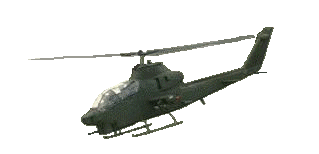

WO1 Patrick Will had been in country for only about two and a half months and he was new to the D Troop 3rd of the 5th Air Cavalryís gun platoon, whose callsign was "Crusaders". He had gone to AH1G Cobra, Attack Helicopter, School before he arrived in Vietnam, but for the past two months he had been flying Hueys in the Troopís slick or "troop lift" platoon, the "Longknives". Until just recently there hadnít been any openings for new pilots in the prestigious Crusaders.
On the 22nd of December 1969, Pat was seated in the front seat of a Cobra flying as co-pilot for WO1 Gerald E. Niewenhous Jr. Copilots were called "Peter Pilot" or just plain "Pete". The Troop was working West of a "Number Ten" (really bad) area called the "Wagon Wheel". They were near the town of Muc Hoa about 50 miles northeast of their home base at Vinh Long.
They were flying as CWO Sam Munnís wingman.
Gerry was in the rear seat of the Cobra and at the controls. He made a very shallow diving rocket run at approximately 120 to 130 knots of airspeed. The run was intended to be a "feint" to fool the enemy; no rockets or weapons were fired.
Midway into the rocket run Pat heard a slight "Tick" noise just to the right side of his helmet.
The noise was immediately followed by Gerryís voice on the helicopterís intercom saying; "Iím hit! Iím hit!"
Pat remembers replying; "Iíve got it! Iíve got it!"
As Pat got on the flight controls he immediately realized that he could not move the tail rotor pedals. In agonizing pain, the aircraft commander had jammed the right pedal full in to the stops. As Pat used the cyclic and pitch controls to stop the dive and slow the Cobra, the aircraft began to rotate about the rotorís mast and spin to the right. Pat soon found themselves at a 1200-foot high hover with the helicopter slowly spinning and nearly out of control.
Pat tried hard to move the pedals. He was reluctant to apply a great amount of force out of concern for causing Gerry more pain. By using the cyclic stick and the collective pitch, he started another shallow dive to gain back some airspeed.
By twisting the aircraftís throttle with his left hand and manipulating the controls he got the aircraft flying forward again and the increased airspeed helped streamline the ship and kept it flying a little straighter. During the speed-producing dive they had descended to two or three hundred feet above the ground.
A rearview mirror is mounted to the upper inside of the Cobraís canopy. When Pat looked at Gerry in mirror he saw that his friend was sitting straight upright, his face was quite red and he was grimacing with pain. Over the intercom, Pat asked him if he could release some of his pressure on the pedals and Pat saw Gerry just shake his head, "no". Gerry remained in that position, "frozen" on the pedals, for the remainder of the flight.
Once he had regained some control and nursed the aircraft up to a speed of 50 or 60 knots, Pat turned to a heading given to him by the lead Cobraís pilot, Sam Munn. Samís ship was now following close behind. Sam had them headed for a nearby airstrip while he was using his radio to arrange medical care and transport for Gerry upon their arrival.
Pat didnít have much experience or flying time in the Cobra. It had been nearly four months since he had completed transition training in Savannah, Ga. While at that school he had practiced simulated tail rotor failures. At the moment that training seemed like it had been done years ago.
The flight to the secure airstrip took about twenty minutes. Sam talked to Pat along the way. Giving him vectors and helping him get started on a long shallow final approach to the Pierced Steel Plank (PSP) matted runway. At times there was a lot of radio chatter between the other helicopters. At one point, out of frustration, Pat yelled on the radio for all the others to "Shut up!" Pat talked to Gerry a number of times but he never answered during the flight to the airstrip.
Patís mind was racing as he had the ship set up on a very long final approach. Each time the power was reduced to help descend or slow the helicopter down, the nose would wander from one side to the other. As he kept the nose straight by carefully moving the throttle, he worried about turning sideways after touching down on the PSP, worried about hanging up a skid on the matting and then rolling the ship into a big fiery ball. He knew had to get aircraft on the ground soon so Gerry could be helped.
He knew with the lack of tailrotor control there would be no option to "Go-around" for another attempt. Pat knew he had one shot at getting safely on the ground. He was sweating buckets as he flew the helicopter with the stubby little flight controls provided for the gunner in the Cobraís front seat.
Pat maneuvered the Cobra safely onto the ground at the end of the runway. The gunship had barely come to rest when four or five guys were there getting Gerry out of the backseat.
They loaded him on to the C&C Huey and headed for Vinh Long, where the nearest hospital was located. In spite of the C&C crewís first aid efforts, Gerald Niewenhous died on the flight to the hospital.
The "Tick" noise that Pat had heard
was made by just one enemy bullet passing by his head. Apparently fired
from quite a long distance away, the round passed through the right side
of the canopy, then through the instrument panel and struck Gerry in the
lower abdomen beneath his armored "chicken" plate.